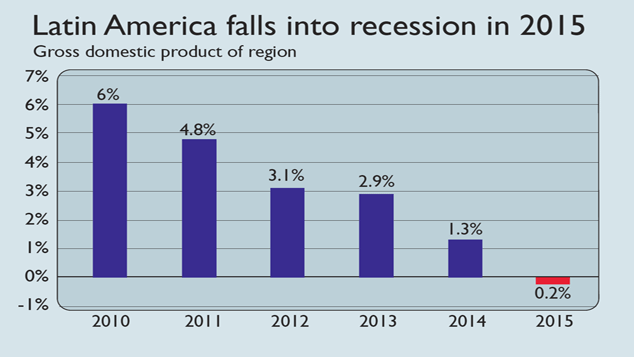Get the latest financial news, insights and expert analysis from our award-winning MoneyWeek team, to help you understand what really matters when it comes to your finances.
You are now subscribed
Your newsletter sign-up was successful
Want to add more newsletters?

Twice daily
MoneyWeek
Get the latest financial news, insights and expert analysis from our award-winning MoneyWeek team, to help you understand what really matters when it comes to your finances.

Four times a week
Look After My Bills
Sign up to our free money-saving newsletter, filled with the latest news and expert advice to help you find the best tips and deals for managing your bills. Start saving today!
"When the last bear turns bullish, it's time to get out," says Nils Pratley in The Guardian, referring to the revelation that Stephen Roach, Morgan Stanley's famously gloomy chief economist, suddenly has a spring in his step.
"I am now feeling better about the prognosis for the world economy for the first time in ages," says Roach in his latest research note. After several years of dire warnings about global trade imbalances and the US current-account deficit, signs that central banks are adjusting liquidity and the IMF and G7 are serious about tackling imbalances have won him round to a semi-bullish position. But not everyone is encouraged by this sudden conversion. "You have to admire the bravery of the call, given that Roach admits the last time he was so optimistic was 1999," says Pratley.
But while Roach may have been the biggest bear in the woods, there are still plenty of others around. Anthony Bolton of Fidelity's Special Situations fund emerged as one last week, revealing that he has bought a three-month put option allowing him to sell a large proportion of his holdings at a pre-arranged price, and has also cut borrowings from the usual 15-20% of shareholders funds to 11.5%. "The bull market in the UK has now entered its final stage," he says, with fewer companies meeting the criteria for inclusion in his fund.
MoneyWeek
Subscribe to MoneyWeek today and get your first six magazine issues absolutely FREE

Sign up to Money Morning
Don't miss the latest investment and personal finances news, market analysis, plus money-saving tips with our free twice-daily newsletter
Don't miss the latest investment and personal finances news, market analysis, plus money-saving tips with our free twice-daily newsletter
It's certainly hard to find value in UK shares, says Patrick Hosking in The Times. While average p/e ratios in the FTSE 100 are at their lowest for ten years, they "are low for good reasons at this stage of the economic cycle, with interest rates rising and growth slowing". And the index has a higher-than-usual weighting towards historically lowly rated sectors such as banks and miners.
Despite this, Hosking thinks that decent yields mean the overall UK market does not look overvalued, although further progress will be harder to come by. The US is a different matter, says John Maudlin on Frontlinethoughts.com. He argues that there is a 13-year cycle in valuations, taking the market from undervalued to overvalued and back again. By historical standards, valuations are still so high that the expected return over ten years is zero.
Get the latest financial news, insights and expert analysis from our award-winning MoneyWeek team, to help you understand what really matters when it comes to your finances.
MoneyWeek is written by a team of experienced and award-winning journalists, plus expert columnists. As well as daily digital news and features, MoneyWeek also publishes a weekly magazine, covering investing and personal finance. From share tips, pensions, gold to practical investment tips - we provide a round-up to help you make money and keep it.
-
 What is a care fees annuity and how much does it cost?
What is a care fees annuity and how much does it cost?How we will be cared for in our later years – and how much we are willing to pay for it – are conversations best had as early as possible. One option to cover the cost is a care fees annuity. We look at the pros and cons.
-
 How to navigate the inheritance tax paperwork maze in nine clear steps
How to navigate the inheritance tax paperwork maze in nine clear stepsFamilies who cope best with inheritance tax (IHT) paperwork are those who plan ahead, say experts. We look at all documents you need to gather, regardless of whether you have an IHT bill to pay.
-
 Who will follow Sri Lanka into a debt crisis?
Who will follow Sri Lanka into a debt crisis?News Sri Lanka defaulted on its debt in May as soaring global food prices and a tourism slowdown collided with years of profligate state spending. Which countries could follow?
-
 The emerging-markets debt crisis
The emerging-markets debt crisisBriefings Slowing global growth, surging inflation and rising interest rates are squeezing emerging economies harder than most. Are we on the brink of a major catastrophe?
-
 Why Vietnam is the star of Southeast Asia
Why Vietnam is the star of Southeast AsiaEditor's letter Emerging markets should be a good source of income in the years ahead, with emerging Asia looking most appealing, and Vietnam the standout performer.
-
 Brazil: an attractive long-term bet
Brazil: an attractive long-term betFeatures Despite all the gloom surrounding Latin America, Brazil is an attractive long-term bet for investors prepared to take the risk, says Sarah Moore.
-
 The assets to buy now – February 2015
The assets to buy now – February 2015Features Asset allocation is at least as important as individual share selection. So where should you be putting your money? Here’s February's take on the major asset classes.

